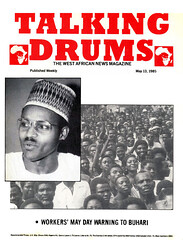Music And Arts Scene
African Records Review By Staccato
NANA KWAME AMPADU'S AFRICAN BROTHERS BAND INT. OF GHANA: 'Obi Doba' (AB 006)
'Obi Doba' 'Ase Yedo Wo'/'Woyoo Woyoo' 'Mede Wo Ka A'
The prolific and versatile Nana Kwame Ampadu and his African Brothers continue to entertain the world despite the problems which they might have been encountering within the music industry. Which African musician has had it easy? One would have thought that Nana Ampadu would have stabilised with one label by now especially after the release of 'Me Poma' on Sterns label. But no! This beautiful LP comes under another amateur label.The choice of colours and the design are not one of the best but the music on this LP is one of the best hi-life releases on the market. Opening with 'Obi Doba' Nana Ampadu encourages his loved one to ignore what people say about her in the same way as A. K. Yeboah preaches in 'People Will Talk Of You' on his latest album released on Asona label. 'Obi Doba' combines perfect guitar twists, tight percussion and well-arranged horns to bolster Nana Ampadu's message. Apart from the beautiful horns incursions, the 'Yaa Amponsah' rhythm guitars behind 'Ase Yedo Wo' lift the track away from ordinariness.
It's story-telling time again in 'Woyoo Woyoo', one of Nana Ampadu's strongest points. Not only is there much wisdom in this story but also the rhythm and the orchestration sound equal to the African Brothers whose fame has quickly spread across the entire musical world. 'Mede Wo Ka A' might sound slightly less urgent but is worth your while
BUMBA MASSA: 'Dovi' (SYLLART 8306)
'Sous-Marin' 'Dovi'/'Mariage Intermediaire' 'Pere Bouchez'
Another Congo/Zaire stuff with swift guitar works and urgent dance floor 'Me Nyame Boame' 'Nwan na Odo ne' appeal, Bumba Massa's 'Dovi' is a late comer on the chart after almost two months in London. Maybe, the "giants" such as Mbilia Bel's 'Keyna' and Tabu Ley's 'Sarah' are out of the scene now. But 'Dovi' can stand on its own as a hot contender on the dance floor.The name given on the first track on the A-side is hardly surprising; 'Sous-Marin' (sub-marine) is enough to conjure an atmosphere propitious for the kind of music to be expected. The tight guitar works and the answer by the combination of the bass and horns sweep some potency and warmth on the floor. The guitar solos in 'Dovi' are far from being repetitive but do not last long enough to register the message. But who cares about solos when busy on the dance floor?
The B-side begins with 'Mariage Intermédiaire', another submarine in the strictest sense. Bumba Massa complains of the prospective brother- in-law's opposition to his love affair. The problem which is posed is: what shall we do if there is any such opposition before marriage? We shall leave it to lovers and concentrate on the music which progresses with the vocals and the devilish guitars. The freshness of the sounds emanating from the horns transfer easily on to the guitars which like almost all Zairean tracks carry the dancing message.
Unlike the rest 'Pere Bouchez' does not conform to the soukous rhythm but will certainly please others. On the whole this is a great album
THE GUITAR AND THE GUN II: Highlife dance music from Ghana. '
(Africagram A DRY 6)
Nulake Kple Fuwo' 'Mungi Awarde' 'Engame Ma Menko' 'Moko Baba'
I never listened to the volume I of this highlife compilation produced by John Collins in his Bokoor Studio on Ofankor, near Accra in Ghana but if the offering on the follow-up volume is anything to go by then John Collins can pat himself at the back for this recording executed under very difficult conditions. (In the last screening of Channel 4 Repercussion on Ghanaian highlife John was shown recording a group in his 'studio').As an album featuring as many as eight groups, all (except, perhaps F. Kenya) are relatively unknown in Ghanaian Highlife circles the variety of rhythms and presentations does give a reasonably exciting view of the current developments in the high life music field.
To mention a few examples, Blind Dzissan and His Morkpolawo Group's two opening and closing tracks on both sides of the album are interesting examples of the use of indigenous language and rhythms to enhance the music that has stood the test of time.
"Munyi Awarde" by Baptist Disciple Singers offers a gospel flavour highlife a development which has been successfully experimented with by some of Ghana's big highlife bands.
The Guitar and the Gun II is a feather in the cap of producer Collins. The cover art work of brightly coloured Ghana national flag with a soldier in full battle outfit playing the guitar.
